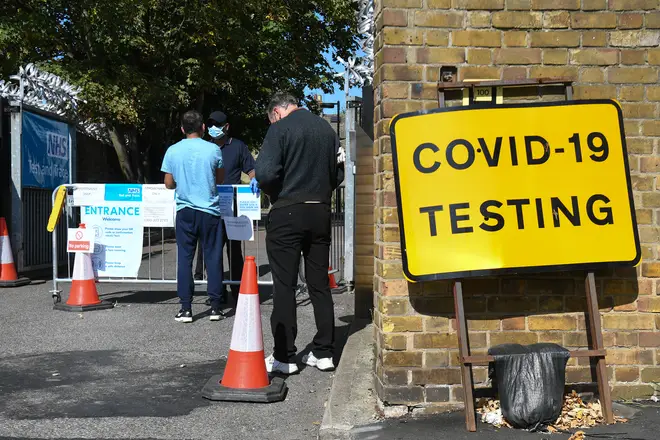
James O'Brien 10am - 1pm
18 September 2020, 14:40

An average of 6,000 people a day became infected with coronavirus between September 4 and 10 – up from 3,200 the previous week.
An estimated 59,800 people in private households in England had Covid-19 between September 4 and 10.
This is the equivalent of around 0.11 per cent of the population, or one in 900 individuals, according to new figures from the Office for National Statistics (ONS).
Read more: Tough coronavirus restrictions imposed on North West, Midlands and West Yorkshire
Read more: Sadiq Khan says respect 'rule of six' or face prospect of curfew rules in London
It represents an increase on the previous estimate of 0.07 per cent for August 30 to September 5.
The latest figures came as the UK's coronavirus R number rose to between 1.1 and 1.4, an increase from 1.0 and 1.2 a week earlier, according to the government's Scientific Advisory Group for Emergencies.

Sadiq Khan tells LBC Covid-19 cases are increasing in London
The ONS said the latest estimate "shows the number of infections has increased in recent weeks".
The figures do not include people staying in hospitals, care homes or other institutional settings.
The ONS said in recent weeks there has been "clear evidence of an increase in the number of people testing positive for Covid-19 aged two to 11 years, 17 to 24 years and 25 to 34 years".
There is also evidence of higher infection rates in north-west England and in London.
It is likely that infection rates in all other regions have also increased, except in south-west England and the West Midlands, the ONS added.
In Wales, an estimated 1,500 people in private households had Covid-19 between September 4 and 10 - the equivalent of 0.05% of the population, or around one in 2,000 people.
Listen & subscribe: Global Player | Apple Podcasts | Google Podcasts | Spotify
The ONS said its findings suggest the number of Covid-19 cases in Wales is "currently relatively stable", but added that because of a relatively small number of tests and a low number of positives in the sample, results should be interpreted with caution.
SAGE confirmed on Friday that the reproduction number of Covid-19 transmission across the country remains above 1, meaning that Britain's epidemic is growing faster.
The R number stands for the rate of infection. It represents the average number of people one infected person passes a virus on to.
Keeping the rate "as low as we possibly can" is vital for beating coronavirus. If the R is above 1 then people will pass it on to more than one individual on average, meaning the spread of the virus is accelerating.